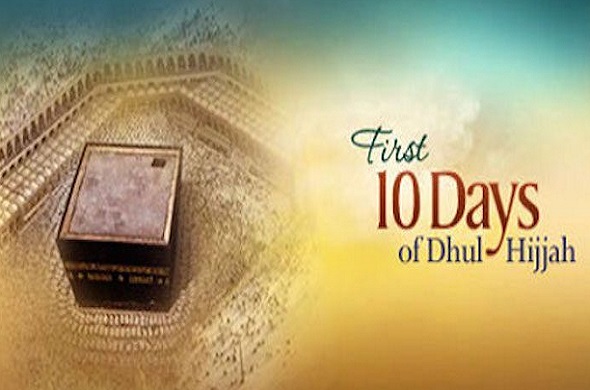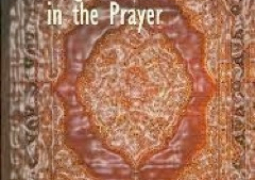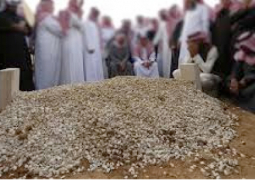
Ibn ‘Abbas reports that the Prophet Sallallahu Alehi Wasallam said: “No good deeds done on other days are superior to those done on these days [meaning the ten days of Zhul-Hijjah].” The companions asked: “O Messenger of Allah, not even jihad in the way of Allah?” He said: “Not even jihad, save for the man who puts his life and wealth in danger [for Allah’s sake] and returns with neither of them.” This is related by the group save Muslim and an-Nasa’i. Ahmad and at-Tabarani record from Ibn ‘Umar that the Messenger of Allah said: “There is no day more honorable in Allah’s sight and no acts more beloved therein to Allah than those in these ten days. So say tahlil [“There is no God but Allah”], takbir [Allah is the greatest] and tahmid [“All praise is due to Allah”] a lot [on those days].” Ibn ‘Abbas says about the ‘ayah, “Remember Allah during the well-known days,” that it refers to the first ten days of Zhul-Hijjah. This is related by al-Bukhari. Sa’id ibn Jubair would push himself very hard [to do good deeds] during these ten days. Al-Auza’i says: “It has reached me that a deed on one of the ten days is similar to fighting in the way of Allah, fasting during its days and guarding during its nights, except for him who becomes a martyr.” As to its source, he adds: “A man from the tribe of Bani Makhzum related that to me from the Prophet.” Abu Hurairah relates that the Prophet said: “There are no days more loved to Allah for you to worship Him therein than the ten days of ZhulHijja. Fasting any day during it is equivalent to fasting one year and to offer salatul tahajjud (late-night prayer) during one of its nights is like performing the late night prayer on the night of power. [i.e., Lailatul Qadr].” This is related by at-Tirmizhi, Ibn Majah, and al-Baihaqi.
The first ten days of Zhul-Hijjah, especially the day of Arafah, for those who are not performing the pilgrimage
Abu Qatadah reported that the Messenger of Allah said: “Fasting on the day of ‘Arafah is an expiation for two years, the year preceding it and the year following it. Fasting the day of ‘Ashurah is an expiation for the year preceding it.” This is related by “the group,” except for al-Bukhari and at-Tirmizhi.
Hafsah reported: “There are five things that the Prophet never abandoned: fasting the day of ‘Ashurah, fasting the [first] ten [days of Zhul-Hijjah], fasting three days of every month and praying two rak’ah before the dawn prayer.” This is related by Ahmad and an-Nasa’i.
‘Uqbah ibn ‘Amr reported that the Messenger of Allah said: “The day of ‘Arafah, the day of sacrifice, and the days of tashreeq are ‘ids for us--the people of Islam--and they are days of eating and drinking.” This is related by “the five,” except for Ibn Majah. At-Tirmizhi grades it sahih.
Abu Hurairah stated: “The Messenger of Allah forbade fasting on the day of ‘Arafah for one who is actually at ‘Arafah.” This is related by Ahmad, Abu Dawud, an-Nasa’i, and Ibn Majah. At-Tirmizhi comments: “The scholars prefer that the day of ‘Arafah be fasted unless one is actually at ‘Arafah.
Being generous in providing household provisions on the day of ‘Arafah
Jabir reported that the Messenger of Allah said: “Whoever is generous to himself and to his family on the day of ‘Ashurah will have Allah’s generosity bestowed on him for the rest of the year.” This is related by al-Baihaqi in ash-Shu’ab and by Ibn ‘Abdul-Barr. The hadith has other chains, but they are all weak; however, strung together these chains strengthen the rank of the hadith, as as-Sakhawi said.
The day of ‘Idul Adha (The “Id of Sacrifice)
The occasion of the ‘Idul Adha (commemorating Prophet Ibrahim’s sacrifice).
On the dayof ‘idul azha the eating should be delayed until one returns from the ‘id prayers and then he may eat of his sacrifice if he has sacrificed an animal.
It is commendable to congratulate one another on the days of ‘id. Jabir ibn Nafir reports: “When the companions of the Prophet met each other on the day of ‘id, they would say to each other, ‘taqabbal minna wa minka [May Allah] accept it from us and you.’” Ibn Hajar said that its chain is hasan.
Recreation, amusements, and singing, if they stay within the moral bounds, are permissible on the days of ‘id. Anas reports: “When the Prophet came to Medinah they had two days of sport and amusement. The Prophet said: “Allah, the Exalted, has exchanged these days for two days better than them: the day of breaking the fast and the day of sacrifice.” “’ Ahmad and Muslim record from Nubaishah that the Prophet (SAW) said: “The days of tashriq (i.e., the days in which the ‘id is celebrated) are days of eating and drinking [non-alcoholic drinks] and of remembering Allah, the Exalted.”
The ‘id prayer is valid for men, women, children, travellers, residents, people in congregation, and people praying individually. It is also valid if performed in a house, mosque, or a distant place designated for the Salah, and so on.
“The Prophet prayed the ‘idul Adha the ‘id of sacrifice while the sun was three meters above the horizon.” Ash-Shaukani says: “That is the best of what has been related concerning the specific time of salatul ‘idain and the hadith shows that it is preferred to hasten in praying salatul azha and to delay the salatul fitr.” Ibn Qudamah says: “It is a sunnah to pray salatul Adha early in order to allow more time for the people to perform the sacrifice,
Going out to the musalla (place of prayer)
Salatul ‘id can be performed in the mosque but it is preferred to perform in a place outside the city as long as there is no excuse or reason to do otherwise (e.g., rain and so on) as the Prophet would pray the two ‘ids in the outskirts of Medinah and he never prayed it in his mosque, except once and because it was raining.



